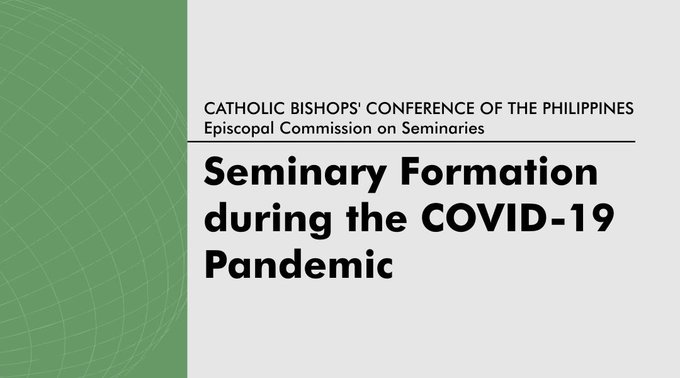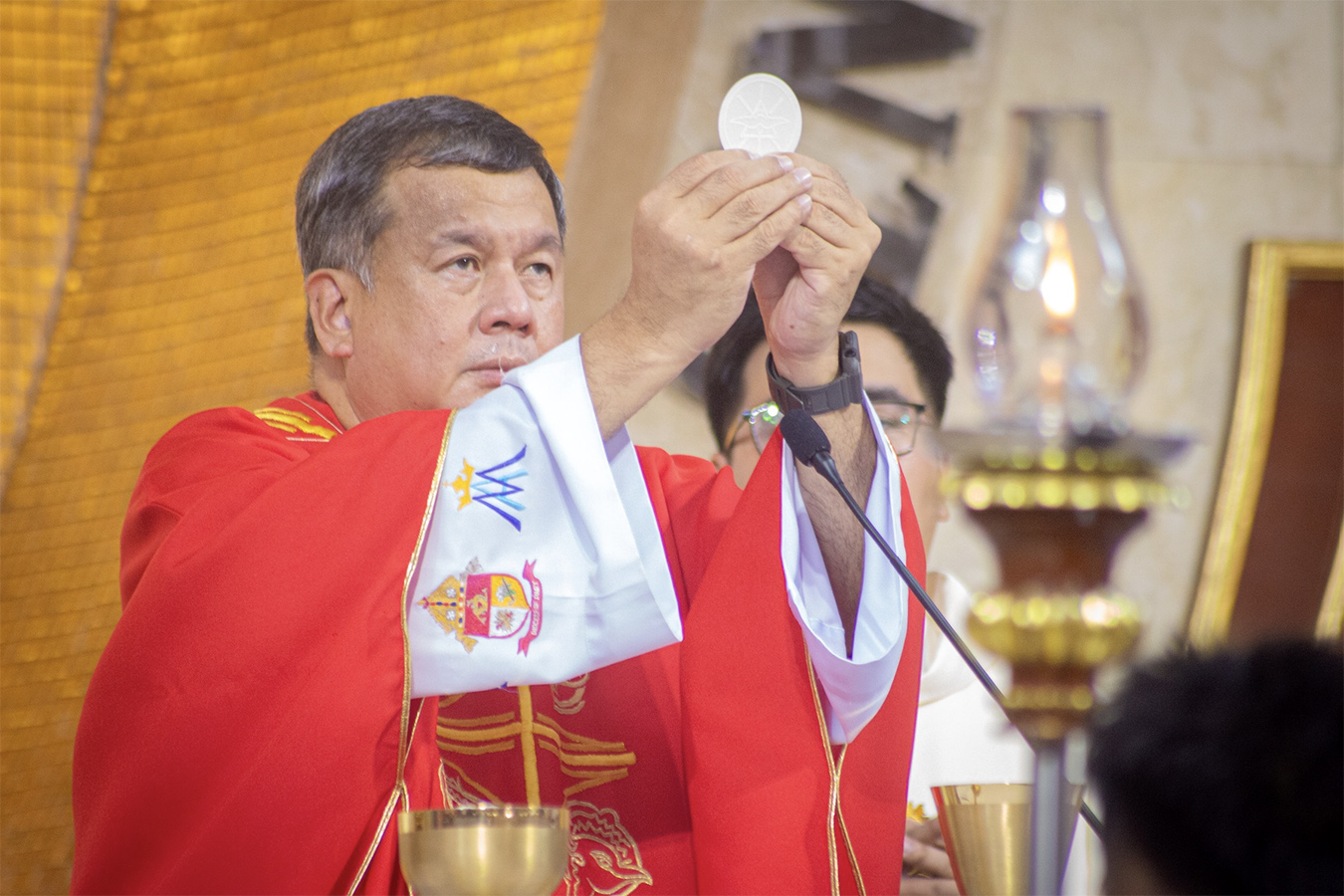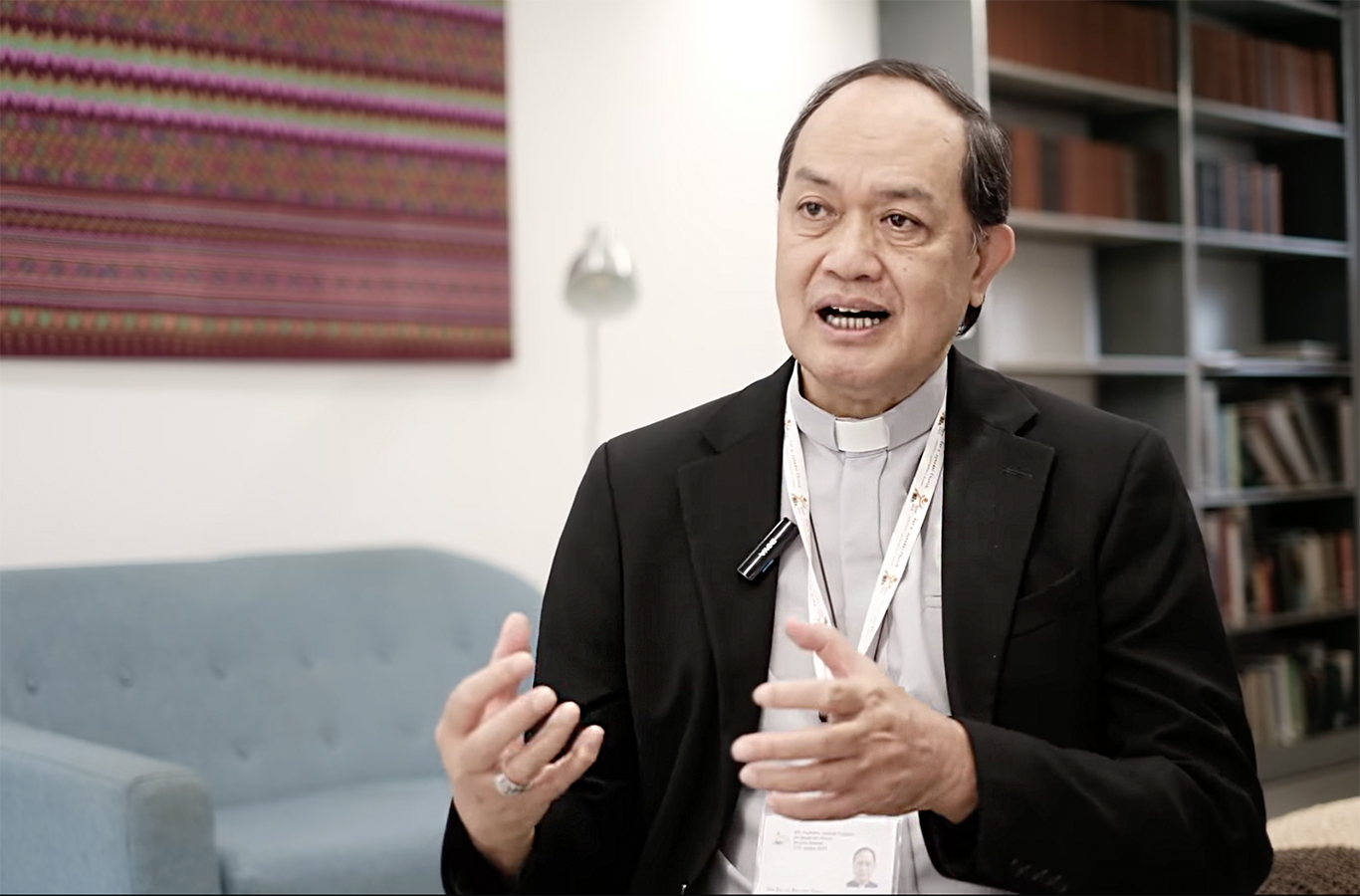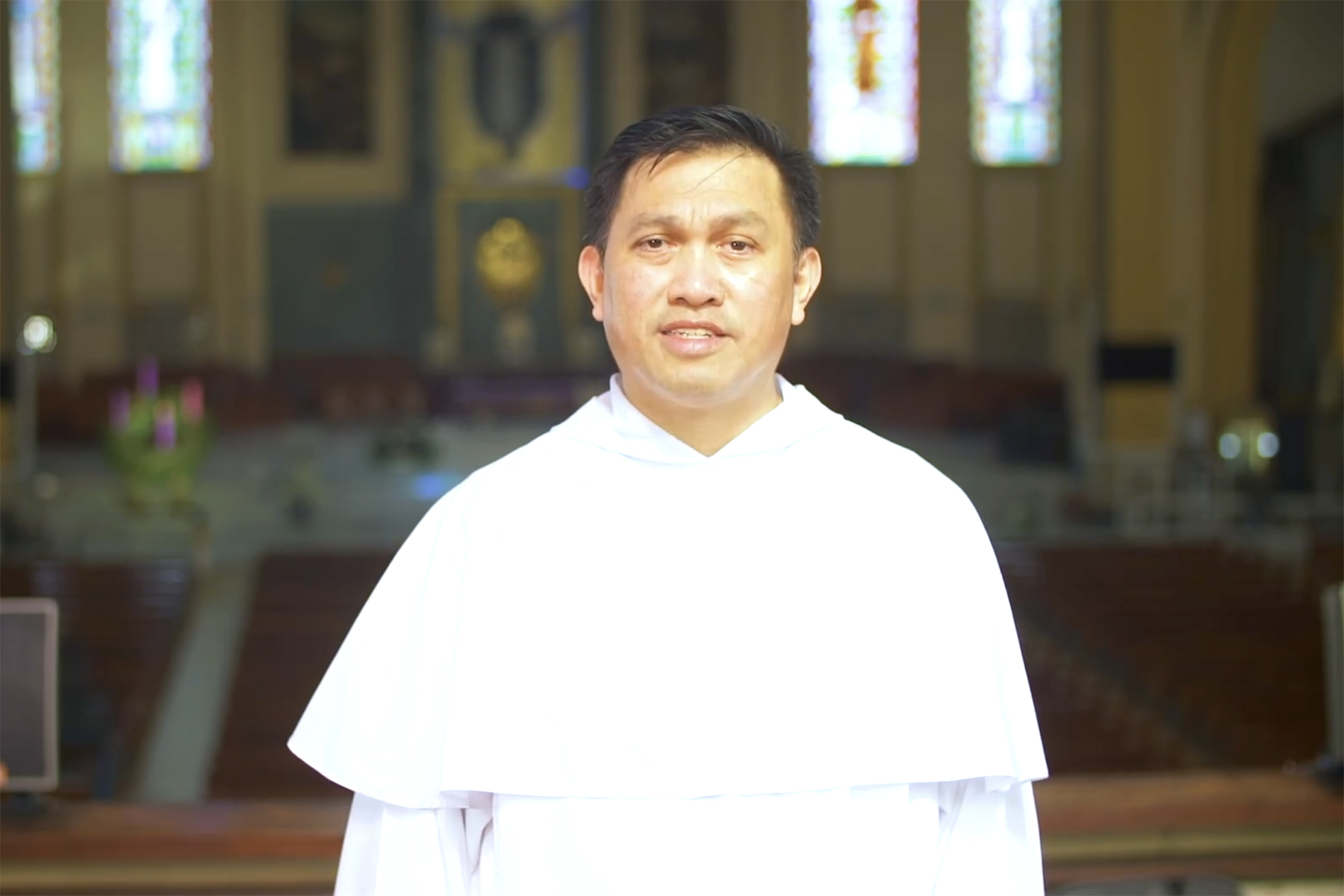
“Come to me… I will give you rest.” Mt 11:28
Pope Francis expressed on our behalf the anxieties of the world in these words, “We find ourselves afraid and lost. Like the disciples we were caught off guard by an unexpected, turbulent storm.
We have realized that we are in the same boat, all of us fragile and disoriented, but at the same time important and needed, all of us called to row together, each of us in need of comforting the other. On this boat… are all of us.
Just like those disciples, who spoke anxiously with one voice, saying ‘We are perishing’, so we too have realized that we cannot go on thinking of ourselves, but only together can we do this.” (Urbi et Orbi, March 27, 2020)
This unexpected tempest called COVID-19 also makes it necessary for us to revisit our program of seminary formation, prayerfully attentive to the signs of the times yet relentlessly faithful to the mind and heart of the Church.
Some Basic Principles:
1. Seminary formation is the intense following of Christ in all aspects of a seminarian’s personality. The intellectual formation is not the only the factor for consideration in seminary formation. The seminarians need to be accompanied in their pastoral, spiritual and human formation too. It is an integrated formation that takes place in the context of community accompaniment.
2. Insofar as the seminary is recognized by the government as an institution of education, the seminary must comply with the prescribed academic requirements including the prescribed opening of the academic year. On the matter of prescribed norms laid down by the Church regarding seminary formation, the diocesan Bishop enjoys autonomy and full jurisdiction.
3. The current situation of the country under the threat of a life threatening sickness whose vaccine and treatment is still being studied by scientific experts, makes it imperative for the diocesan Bishop to comply with the health norms laid down by the civil authorities. The bishop is as concerned with the health and well-being of seminarians as civil authorities are; in fact even more, for his care is that of a shepherd.
4. The seminary administration under the direction of the diocesan Bishop must adhere to the instructions of the civil authorities regarding proper conduct during this pandemic. The three elements that stand out are SOCIAL DISTANCING, PUBLIC and PERSONAL HYGIENE and WEARING of FACE MASKS. The revised seminary discipline during the pandemic must include the scrupulous observance of hygiene through frequent handwashing, wearing face masks and social distancing in all seminary activities.
5. We are stewards of God and our bodies are gifts from the Creator. The fifth commandment not only forbids us to murder but also obliges us not to tempt God with our recklessness and imprudence. We must not endanger the lives of our seminarian sons through our negligence. It is a Christian obligation to obey the quarantine and scrupulously observe hygiene.
Some Practical Considerations:
1. The suggested online classes NORMALLY cannot apply to seminary formation due to the other pillars of priestly formation requiring personal accompaniment in the context of community. The seminary community is a family, and it is as a family that we will go through this pandemic.
2. However, in extreme conditions, the academic deans may study prudently which MINOR subjects may be delivered online. The MAJOR subjects are best taught with physical presence of the teacher and with interaction among the seminarians. The resident formators need to be more hands-on and to even consider to teach more subjects than they used to teach. In fraternal charity, we must consider the situation of extern seminarians enrolled who may really need to take their classes online.
3. The seminaries may consider scheduling the return of their seminarians by batches. Mandatory self-quarantine will be observed. They must be “cleared” by available doctors. Only then shall they be integrated into the community. Once they have been integrated into the community, they shall become like a household; there is no need for a mask. But for those allowed to leave the premises for marketing, errands and the like, they shall exercise extreme caution and strictly follow the protocols.
4. The seminary will make available physicians and nurses who will see that each seminarian is free from symptoms of the virus or of any other contagious disease. When symptoms are found, the seminarian will receive proper medical attention and care, and, if necessary, according to the discernment of the Rector, may be given time to recuperate. When he has recovered completely, he will be invited to rejoin the seminary community.
5. In the observance of social distancing it is recommended that the seminarians be assigned permanent places in the chapel, refectory, classrooms and library. The places can be marked so that the seminarians are not left to just estimate their distances from one another.
6. If the chapel and refectory are not spacious enough to accommodate social distancing, the seminary can explore two batches for Masses, prayers and meals.
7. The wearing of face masks being mandatory under the Enhanced Community Quarantine and General Community Quarantine guidelines, it shall also be mandatory in the seminary when seminarians gather in groups more than five persons socially distanced. When a seminarian is in his individual room (for those who have individual rooms) he need not wear the face mask.
8. For the sake of hygiene, it is advisable to assign particular bath cubicles and toilet bowls to each seminarian in the event that contact tracing may be required. Seminary authorities shall also see to it that all kitchen utensils are properly disinfected and that commonly handled surfaces such as doorknobs, toilet flushers and similar must be wiped clean with proper disinfectants. Even sacred vessels such as the paten and the ciboria must be properly disinfected, with due regard for the consecrated nature of these vessels. For the moment, there will be no participation in the precious Blood. Concelebrants are to partake of the precious Blood through intinction only.
9. It may be necessary to limit to the minimum the availability of free time for the seminarians to go out of seminary premises in order to minimize exposure or contamination. Visitors must not be allowed personal contact with the seminarians. Items shall be left in designated areas. The visitors are to be disinfected before they enter the premises but only until the areas designated to drop off their items. Even exposure and interaction with seminary staff need to be prudently restricted.
10. The norms laid down by the Episcopal Commission on Liturgy with regard to the celebration and reception of the sacraments must be observed.
11. The areas where the community daily gathers must be disinfected daily according to the standards laid down by the Department of Health.
12. Individual confessions and spiritual directions may be done with both confessor/director and seminarian wearing face masks. It is preferred that the Sacrament of Penance be administered in such wise as to avoid the use of the confessional or confession box, with the seats of confessor and penitent parallel to each other, but facing in opposite directions, observing the proper distance.
13. Human formation counselors may do their regular accompaniment with the seminarians virtually, one-on-one sessions without physical contact, by making available a consultation room with strong wifi-connection, with proper observance of counseling protocols. The room and equipment must be disinfected every after use.
New Outlook
1. The seminary formators are advised to contextualize the spiritual conferences, theological and philosophical convocations, pastoral talks and homilies within the current situation of the world. COVID-19 has been metaphorically called a doorway leading to a new rupture in the world. The seminarians will be the future priests on whose shoulders will be laid the task to lead our flock into that new world.
2. Seminary formation during COVID will probably have more the flavor of “propaedeutic” and “vocational synthesis” stages. While we ensure that it is integral, the dimensions of human and spiritual formation will be highlighted and pastoral formation necessarily will have a “shift”. Apostolate will be an “inside” experience but for the “outside.”
3. Due to the unprecedented situation that the world is going through, the seminarians and formators should be organized to form small circles of discernment to look at the situation from the divine perspective and to respond to the condition with a pastoral heart. The seminarians must be constantly reminded sentire cum ecclesia and all formation for ministry must be pro vita mundi.
4. This is an opportune time to revisit and readjust existing customary community gestures and practices, such as fraternal expressions of physical affirmation, playing contact sports, the customary fraternal abrazos, etc.
5. Although the vision to be a church of the poor has been repeatedly taught in the past, the current condition of the world necessitates a formation in deeper simplicity and poverty of lifestyle among seminarians in communion and in solidarity with the increasing number of poor people. The engagement of the seminarians in alleviating the sufferings of the poor such as providing food relief bags, coming from their personal sacrifices according to their age and situation, must be encouraged.
6. More than ever, due to the rapidly changing situation of the world, it is even more necessary that the seminary employ the regular services of counselor psychologists and mental health experts so that the rapid changes our seminarians and formators are going through may be processed professionally. To ignore the changes now can harm the future.
Through the centuries, the firm point of the seminarians’ daily life and the foundation of his spiritual and human structure is his deep personal friendship with the Lord. From this intimacy with the Lord, may he live a life that is fully human in the celibate state, with a joyful zeal to share in the mission of the Lord for the salvation of the world!
May Mary Help of Christians and Mother of Priests protect her seminarian sons and help them to become like her Son.
Submitted by the CBCP Episcopal Commission for Seminaries for adaptation and approval by the Archbishops and Bishops for the seminaries within their jurisdiction.
May 15, 2020, Memorial of San Isidro Labrador
+SOCRATES B. VILLEGAS
Archbishop of Lingayen Dagupan
Chairman, Episcopal Commission for Seminaries








